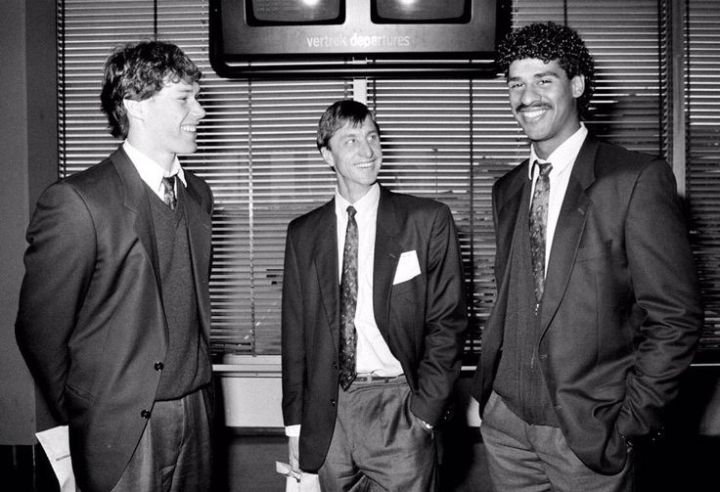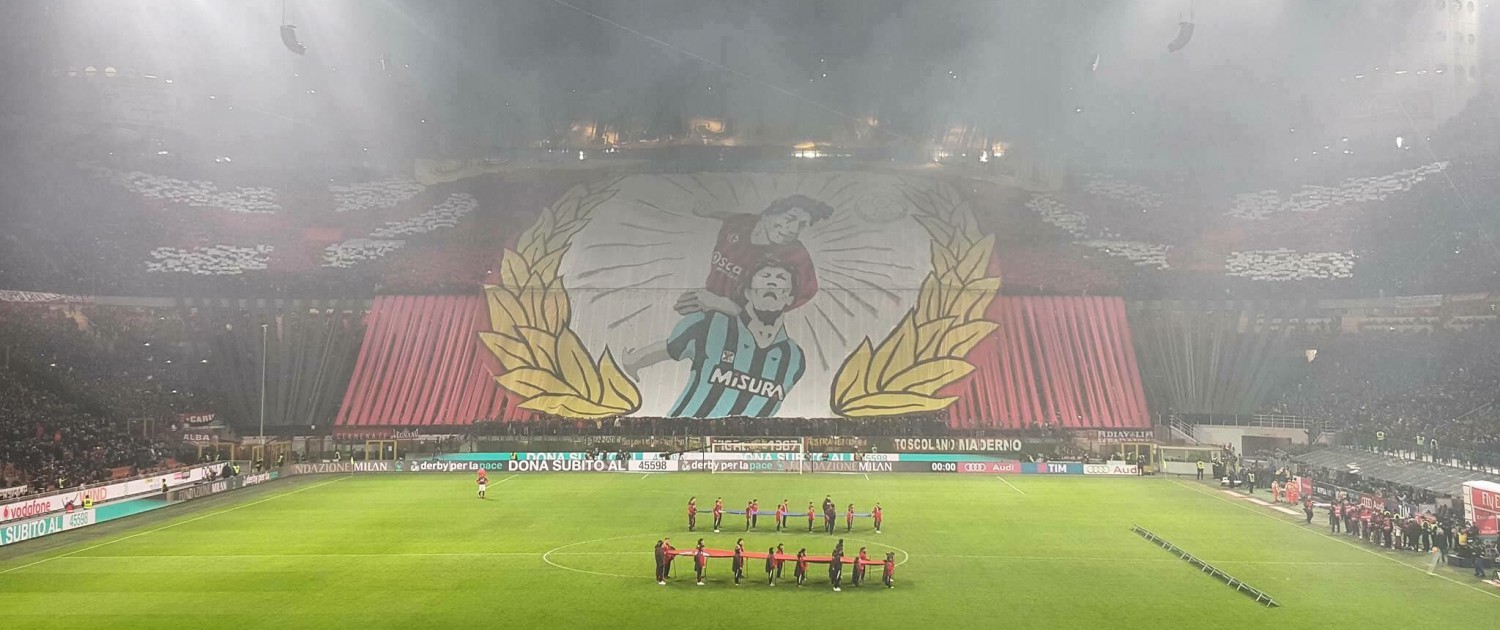The word legend in football terms is often overused. It has, since the invention of social media, become a cliché, meaningless in most cases. However on the 15th of November, 1964, when a skinny long haired kid from Amsterdam laced up his boots and took the field for the first time in the famous red and white strip of Ajax, a legend was born. An icon was made. That Ajax were at the lowest point in their history, 13th in the league, made no difference to Johan Cruyff. He would soon have them at the top of the world. Playing a brand of football no one had never seen.
Cruyff and AC Milan have quite the history. By 1969, Johan and Rinus Michels had turned around the fortunes of the side from the Dutch capital. The incorporation of a new brand of football, which came to be known as “Total Football”, had paid dividends. Johan and a crop of young talented Dutch players pulled Ajax out of obscurity and onto the European scene becoming the first Dutch squad to make it to the European Cup final after four seasons of domestic dominance. Johan Cruyff’s Ajax seemed destined to conquer Europe but that dominance would be delayed by the Rossoneri. Nereo Rocco’s side was probably best suited to tame Ajax on the continent. Catenaccio was at its height and Trapattoni and Schnellinger held the Dutch side to just one goal, winning the European Cup 4-1. Ajax and Cruyff would be back two years later defeating Greek side Panathinaikos 2-0 and also saw the enigmatic Dutchman win the European Footballer of the Year award. Despite the departure of Rinus Michels to Barcelona after the cup win, Ajax’s dominance would continue. Two more European cups would follow with victories over Internazionale (Cruyff scored both goals in the final) and Juventus which would cement Ajax’s European Dynasty.
Cruyff would be sold to Barcelona after snubbing Real Madrid for their association with fascist dictator Francisco Franco. He was welcomed in Catalonia with open arms especially after FC Barcelona, led by their newly adopted son, won their first La Liga title since 1960, destroying Real Madrid 5-0 along the way. Another European Footballer of the Year would follow in 1974 with Cruyff leading Holland to the World Cup final losing to Germany at the Olympic Stadium in Munich. Cruyff, reunited with Rinus Michels with the national team and boosted by players like Johnny Rep, Rob Rensenbrink and Johan Neeskens, set the World Cup alight. “Total Football” on the world scene dazzled the watching audience. It looked like Cruyff and Holland would win the World Cup after just the first minute of the Final when Cruyff himself was taken down in the box by Uli Hoeness after just one minute. Neeskens converted the penalty but Paul Breitner and Gerd Muller would see to it that the Dutch would not win the World Cup on German soil. In the end, Beckenbauer would lift the trophy. It would be Cruyff’s last match in the World Cup.
Cruyff, always the trailblazer, left Barcelona for the United States where he enjoyed the anonymity of being a soccer player in America. In May 1981 Johan Cruyff once again came in contact with the Rossoneri. Cruyff signed on to play in a friendly tournament with AC Milan. It was called the Mundialito de Clubs and it was the inaugural edition of the bi-annual tournament which was organized by Channel 5. Cruyff’s Ajax past was not far behind him as he would play Ajax’s rival Feyenoord in the competition. Cruyff would be injured while playing with Milan, delaying his start to the NASL season and would eventually cause him to leave America altogether.
Cruyff played on for many more years after a return to Ajax and even a stint with their rivals Feyenoord winning the club their first Eredivisie title in over a decade and at the ripe old age of 36 being named Dutch Footballer of the Year. It was at the end of the 1984 season that the Dutchman would hang up his boots and soon after his coaching career would begin.

Cruyff, welcomed back to Ajax, took charge of a young side which featured future Rossoneri Marco Van Basten and Frank Rijkaard but it was at Barcelona where he would once again make his mark.
As manager of FC Barcelona, he would once again revolutionize the Catalan Club bringing in players like Josep Guardiola, Hristo Stoichkov, Romario, Ronald Koemans and Txiki Begiristain he had created a “Dream Team” which would dominate La Liga and win the European Cup defeating Sampdoria in Wembley in 1992. Once again, destiny would bring him in contact with the Rossoneri, this time led by Fabio Capello; Milan would meet FC Barcelona in the European Cup final of 1994 in Athens. Milan without their captain and talisman Franco Baresi were considered the underdog, a long shot to beat Cruyff’s Dream Team. Having just won their fourth La Liga title on the trot you could understand why the Spanish side was so confident. Before the match Cruyff lashed out stating “Milan are nothing out of this world.” His outburst would galvanize the Rossoneri as Capello and Co. set out to make Cruyff eat his words. Milan smothered the Barcelona midfield, and made a mockery of their defence winning 4-0 on the strength of two goals from Massaro and one each from Savicevic and Desailly. Probably the best memory Milan supporters have of Cruyff is of him sitting cross legged on the sidelines watching on helplessly as his Blaugrana crashed and burned. Cruyff would not win another title with Barcelona and was sacked two years later as the winningest manager in FC Barcelona history.
Most will remember him for his famous “Cruyff Turn” but the man was much more than that. Cruyff revolutionized the game with his never ending desire to not only play football but to entertain. Cruyff will also be remembered for his insistence on the creation of a youth system at Barcelona to rival that of Ajax. His vision became La Masia, a place where youth would be ushered through a conveyor belt while honing the skills and discipline which would make the step into the first team seamless. The fruit of his amazing foresight and vision is still falling from the trees in Catalonia and most likely is directly linked to Barcelona’s recent dominance under Cruyff’s pupil Josep Guardiola and currently Luis Enrique. It was his never ending pursuit to perfecting the way that the game is played that will best describe Cruyff. Perhaps a man ahead of his time, he was still able to get the very best out of what he had and created a legacy which still inspires many footballers and managers around the world. For instance, many of his players from his Barcelona Dream Team are currently managers, no doubt using many of the techniques learned from Cruyff.
Many have been able to play and manage in this game at a very high level, but very few have actually changed the sport. Johan Cruyff ticks all of the boxes and is most likely the greatest footballer and footballing mind Europe has ever brought forth. To borrow a quote from football journalist Graham Hunter Johan Cruyff is “pound for pound the most important man in the history of football.” Few would disagree. Rest in Peace Johan Cruyff, you will never be forgotten.

